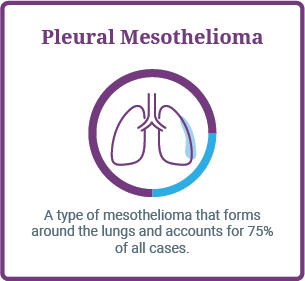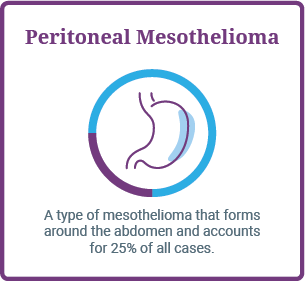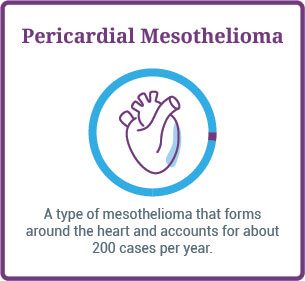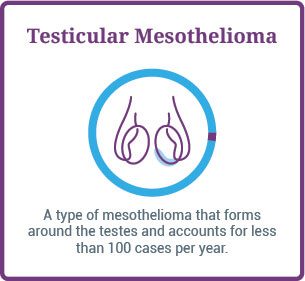Mesothelioma Cancer
Mesothelioma is a type of cancer that develops in the thin tissues surrounding many of our internal organs. Life expectancy for mesothelioma is around 12 months. Treatment may improve prognosis, extend life expectancy and ease a patient’s symptoms.
What Is Mesothelioma?
Malignant mesothelioma is a cancer caused by exposure to asbestos, a toxic mineral that was used in many construction and automotive products. Around 3,000 people in the U.S. are diagnosed with mesothelioma every year.
The majority of cases are pleural mesothelioma, which forms in the lining of the chest cavity, known as the pleura. Peritoneal mesothelioma, the second most common type of the disease, forms in the lining of the abdominal cavity, also known as the peritoneum.
Because of the long latency period, about 10-50 years, the majority of mesothelioma patients are diagnosed in their late 60s, and most of these patients are men who were exposed to asbestos on the job.
For the best prognosis, doctors recommend surgery, radiation, chemotherapy or a combination of these mesothelioma treatments. But emerging treatments, including clinical trials, are showing promise.
Treatment during the early stages of the disease offers the best chance of survival. But patients in the late stage of the cancer may benefit from clinical trials.
Certain factors, such as type of mesothelioma, treatment and cell type, could help you live a longer and healthier life.
Types of Mesothelioma
There are four types of mesothelioma that are defined by where the cancer forms in the body.
- Pleural mesothelioma accounts for 75% of cases and forms around the lungs.
- Peritoneal mesothelioma is found in 20% of patients and develops in the abdominal cavity.
- Pericardial mesothelioma is diagnosed in 2% of cases and grows on the lining of the heart.
- Testicular mesothelioma is identified in less than 1% of patients and spreads on the testes.
Causes of Mesothelioma
When asbestos fibers are inhaled, they become lodged in the lining of the lungs or chest cavity. After many decades of cellular damage, the fibers alter the cell’s DNA, causing mesothelioma tumors to develop and spread.
- Working in a high-risk job such as a firefighter or construction worker
- Working in an asbestos mine or an asbestos processing plant
- Renovating a building that contains asbestos materials and not taking safety precautions
- Military veterans, especially those who served on Navy ships
- Living with someone who works with asbestos products, which can lead to secondary exposure

Mesothelioma Symptoms
Different types of mesothelioma cause different symptoms.
For example, pleural mesothelioma primarily causes pulmonary symptoms because it develops in the chest cavity. While peritoneal mesothelioma, which forms in the abdominal cavity, causes digestive symptoms.

Pleural Mesothelioma Symptoms
- Dry cough
- Chest pain
- Fatigue
- Wheezing
- Shortness of breath
- Weight loss

Peritoneal Mesothelioma Symptoms
- Weight loss
- Fatigue
- Abdominal swelling or tenderness
- Hernias
- Loss of appetite
- Feeling full

Pericardial Mesothelioma Symptoms
- Irregular heartbeat
- Difficulty breathing
- Chest pain
- Fever
- Night sweats
- Fatigue

Testicular Mesothelioma Symptoms
- Hydrocele (fluid buildup in the scrotum)
- Painless scrotal mass
Mesothelioma Diagnosis
Imaging scans are the first steps toward identifying the location and size of tumors. Tissue samples called biopsies are taken to confirm the kind of mesothelioma cancer cells in the tumors.
Doctors will also determine the mesothelioma cell type during the diagnostic process.
- Epithelioid: Most common cell type. Accounts for 50% to 70% of cases. It is the least aggressive cell type and responds best to treatment.
- Sarcomatoid: It accounts for 10% to 20% of cases. It is the most treatment-resistant cell type and has a poor prognosis.
- Biphasic: This cell type is found in 20% to 30% of cases. It includes a combination of epithelioid and sarcomatoid cells. Life expectancy and prognosis depend on the ratio. The more sarcomatoid cells present, the poorer the prognosis.
Blood tests may be used as a diagnostic tool, but only a biopsy can confirm a mesothelioma diagnosis. While mesothelioma can be misdiagnosed as other conditions, such as pneumonia or adenocarcinoma, which is a form of lung cancer, this is less likely to happen once a biopsy has been done.
Mesothelioma Staging
Identifying cancer stage, or spread of tumors, helps doctors determine the types of treatments that provide the patient the best chances of survival. Mesothelioma cancer is staged using a number system of 1 through 4.
Early-stage patients are diagnosed at stages 1 or 2. Late-stage patients are diagnosed at stages 3 or 4.
- Stage 1: Tumors are localized to the pleura. Symptoms are rare.
- Stage 2: Cancer cells have moved into nearby lymph nodes and small tumors form, which may be removed with surgery.
- Stage 3: Tumors have moved to nearby organs and distant lymph nodes. Some patients may be eligible for surgery at this stage.
- Stage 4: Tumors have spread throughout the chest cavity or abdominal cavity. Most patients are ineligible for surgery, but radiation and chemotherapy may reduce symptoms.
Mesothelioma Treatment
Doctors treat mesothelioma with conventional therapies such as surgery, radiation and chemotherapy. However, some patients may be ineligible for a particular treatment because of their unique diagnosis. These patients may opt for clinical trials.
- Surgery: This is the most effective treatment option for improving prognosis and extending survival. About 15% to 20% of mesothelioma patients are diagnosed early enough to qualify for surgery.
- Chemotherapy: It is by far the most commonly received treatment among people with mesothelioma. Chemotherapy can relieve symptoms and extend survival.
- Radiation Therapy: Primarily used in multimodal treatment plans, which combines more than one type of therapy, radiation therapy can prevent local recurrence after surgery. It is occasionally used on its own to shrink chest-wall tumors.
- Multimodal: This treatment regimen involves the use of two or more conventional treatments to slow the growth of pleural and peritoneal mesothelioma tumors.
- Clinical Trials: Doctors and researchers use these patient studies to test experimental treatments, which help them develop new therapies or improve existing treatments.
While none of these treatments can cure the cancer, they have helped many mesothelioma survivors outlive their prognosis by years. Some patients who were diagnosed early and elected aggressive treatment have lived longer than 10 years.
Specialized Mesothelioma Doctors & Cancer Centers
Mesothelioma doctors are a patient’s best hope for extending life and improving prognosis. Specialists, such as Dr. Robert Cameron and Dr. Abraham Lebenthal, have spent years treating patients throughout their medical careers. They follow the latest mesothelioma treatment breakthroughs that may hopefully benefit their patients.
Likewise, the top mesothelioma cancer centers, including Brigham and Women’s Hospital and MD Anderson Cancer Center, provide patients with a multidisciplinary team of experts who can handle all aspects of your care. They have access to the latest clinical trials and the best cancer care technology.


Financial Assistance
Paying for treatment can be burden for a mesothelioma patient and their loved ones, but mesothelioma compensation is available to people diagnosed with the cancer.
Patients and families can hire a mesothelioma attorney who will help them access the funds they need to cover medical costs, lost wages and other treatment expenses.
- Grants
- Asbestos Trust Funds
- Travel Grants
- Lawsuits
- Settlements
- Social Security Disability
Mesothelioma Prognosis & Life Expectancy
The prognosis for mesothelioma is poor, but undergoing treatments, making lifestyle changes and eating a balanced diet can improve your prognosis.
Life expectancy for most mesothelioma patients is between 12-24 months after a diagnosis. But patients can extend their life expectancies by finding the right doctor who specializes in their type of mesothelioma. This is their best chance at beating the average one-year survival rate.
There are also things you can do on your own to improve your overall health and well-being. Improving your diet and exercising can boost health before, during and after cancer treatment. Complementary therapies, such as meditation, yoga and massage, can enhance well-being as well.
Physical, Mental & Social Effects of Mesothelioma
A mesothelioma diagnosis impacts a person physically, mentally and emotionally. Learning about what to expect can help you improve your prognosis and quality of life as a mesothelioma patient.
Physical
As the cancer progresses, the tumors envelope vital organs. This causes physical effects such as pain or difficulty breathing. In the final stage of mesothelioma development, metastasis (distant spreading) occurs. Late-stage mesothelioma patients may experience difficulty swallowing, hoarseness, facial nerve damage, low blood sugar and nerve pain in the arms.
Mental
Cancer and chemotherapy can affect cognitive function. It may be temporary or may last for several years after therapy. If you notice symptoms of chemo brain, such as slow or foggy thought processing, be sure to inform your doctor right away. There are cognitive training tools that patients can use to reduce the effects of chemo brain.
Social
Since mesothelioma is a rare cancer, you may not know anyone else who has faced it. This factor leaves many people with mesothelioma feeling alone or like no one understands what they’re going through. These feelings are normal, and there are things you can do to address them.
Try joining a cancer support group, reaching out to a trusted friend and talking with a counselor. Be open with your loved ones and caregivers about your hopes and fears and listen to theirs in return.
Resources for Patients & Families
In addition to helping people access the nation’s best mesothelioma doctors and cancer centers, we’re here to simplify things for you and your family. Whether coordinating with doctors, applying for travel grants or connecting you to clinical trials, our patient advocates are here to help.
All of our resources are free and patient advocates are available 24/7.
Mesothelioma Packet
Everything you want to know about mesothelioma is delivered to your doorstep in a convenient packet. Our 200-page book explains how mesothelioma is diagnosed and treated and offers information on improving prognosis. Each mesothelioma packet is tailored to your diagnosis, and any information you request is included.
Doctor Match
We connect people with mesothelioma doctors who specialize in treating this rare cancer. Our Patient Advocates match patients with experts who live nearby and specialize in their type of mesothelioma.
Financial Assistance
Paying for mesothelioma treatment isn’t easy. Let us help you afford treatment. From travel grants and free lodging to mesothelioma trust funds, financial assistance is available to patients diagnosed with mesothelioma and their loved ones.
Support Group
Our monthly online support group offers patients space and time to connect with and receive support from other people with mesothelioma. Don’t pass up this opportunity to meet with other mesothelioma patients and address the mental and emotional effects of mesothelioma.
 Do You or a Loved One Have Mesothelioma?
Do You or a Loved One Have Mesothelioma?